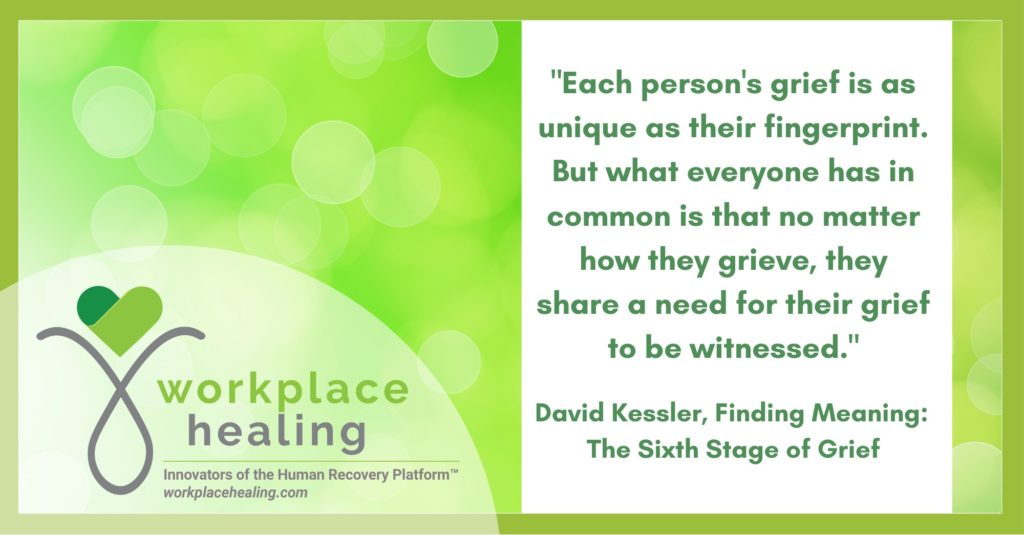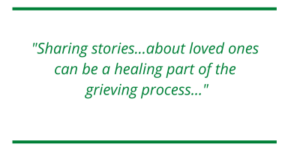
9 Ways to Support Grieving Employees on Memorial Day
Memorial Day can be a tough holiday for employees experiencing a life disruption. Thoughtful leadership strategies can help grieving employees feel more at ease, less distracted and less alone.
Many of us eagerly anticipate Memorial Day as a long holiday weekend spent relaxing with family and friends, celebrating annual traditions, and kicking off the unofficial start of summer.
But for employees struggling through life disruptions that cause grief, like the death of a loved one, illness, divorce or caring for an aging parent, holiday weekends can carry nostalgic—and distressing—reminders of how things used to be.
Leaders who take time to thoughtfully connect with grieving employees can help them feel less stressed and isolated as the holiday weekend approaches.
What’s the purpose of Memorial Day?
For many veterans, active-duty and reserve service members, and Gold Star families, Memorial Day is a sacred day of national remembrance for friends and loved ones who never made it home.
The roots of Memorial Day trace back to General John A. Logan, who led an organization for Northern Civil War veterans and called for a “Decoration Day” in the aftermath of the Civil War. The first national day of remembrance was on May 30, 1868, and 5,000 people gathered at Arlington National Cemetery to decorate the graves of 20,000 Civil War soldiers.
Decoration Day eventually became known as Memorial Day and evolved to commemorate veterans from all of the wars in which American military personnel served and died. Memorial Day became a federal holiday in 1971.
Why should company leadership pay attention?
Memorial Day can bring up complicated emotions as grieving employees contemplate a holiday that will look different than years past due to changing family dynamics.
Without a balance of head and heart-based leadership support, grief affects an employee’s ability to focus and perform at normal capacity. Here are 9 ways you can offer extra support this Memorial Day.
1) Acknowledge the loss—yes, including suicides.
Whenever an employee is grieving the death of a loved one, most people know to express their condolences. But many people, including business leaders, get flustered and aren’t sure what to say in the event of a suicide. When supervisors and colleagues pretend nothing happened, it can compound a person’s grief, adding to feelings of isolation, guilt and shame.
The mental health crisis touches all comers of society and the military is no exception. Since 9/11, the rate of military suicides has skyrocketed. Death by suicide among active-duty personnel and veterans has reached 30,177, which is four times the number of men and women who have been killed in battle.
Even if your employee isn’t grieving the death of a soldier by suicide, they may be caring for an at-risk spouse or another loved one struggling with physical, mental and emotional wounds, including traumatic brain injuries, depression and post-traumatic stress disorder.
Whether your employee is grieving a suicide or caring for someone struggling with a mental health condition, here are some ways to express support.
“I don’t know what you’re going through, but I’m here for you and I care about you.”
“I wish I had the right words, just know that I care.”
These statements are much more meaningful and compassionate than blanket statements like “how are you?” or “how are you feeling today?”
You might also suggest helpful resources like the American Foundation for Suicide Prevention’s Healing Conversations program, in which volunteers who are survivors of suicide loss provide ongoing personal support and guidance to those who have lost loved ones to suicide. (For those in crisis, call, text or chat 988, a free 24/7 Suicide and Crisis Lifeline.)
To learn more about supporting an employee through suicide loss, check out our article 8 Ways Business Leaders Can Support an Employee Grieving a Suicide.

2) Commemorate Memorial Day.
Decorate the office for Memorial Day and create a display board or virtual wall for your employees to post photos of their loved ones who lost their lives or went missing in action while serving our country.
Of course, many veterans go on to leave the battlefield behind and live a long life. As part of your commemoration, include employees grieving the loss of a parent, grandparent or another loved one who was a veteran by extending the opportunity for them to share photos and stories.
3) Offer a helping hand.
Taking action to help others can be a healing part of the grief process. In honor of Memorial Day, raise funds as a team to support veterans in your community.
If you have an employee who is grieving a service member, caring for a veteran struggling with mental health issues or an age-related condition like dementia or Alzheimer’s, ask if there’s a particular organization that resonates with them.
Need ideas? Choose from multiple organizations that support veterans, including St. Michael’s Veterans Center which assists homeless veterans in Kansas City, the National Coalition for Homeless Veterans, and Hire Heroes USA, which helps military service members transition into civilian life. Also, check out The Battle Within, which was started in Olathe, KS, by veterans, first responders and community leaders to help warriors heal in mind, body and spirit and reintegrate into their families and communities.
Learn more about post-traumatic growth in our special four-part series.
4) Support grieving Gold Star families.
You can also commemorate veterans who lost their lives by sponsoring a fundraiser for families left behind. Organizations like America’s Gold Star Families, Folds of Honor and Fallen Patriots provide college scholarships and other assistance to families and children of military personnel who have died. According to Fallen Patriots, nearly 25,000 children have lost an active-duty parent and many are supported by single mothers. 
5) Make space at your table.
Memorial Day isn’t only difficult for families of deceased soldiers. Like any other holiday, changing family dynamics and the loss of family traditions can be difficult to navigate for anyone going through divorce, struggling with a personal health crisis or caring for a loved one.
Don’t assume your employee will be spending the weekend with loved ones. If your grieving employee doesn’t live near family, they may be dreading the prospect of an empty holiday weekend when everyone else is otherwise engaged with friends and family. If you can, invite them to join you and your family at your holiday barbecue or picnic.
6) Deliver a thoughtful gesture.
Even if your grieving employee does have weekend plans or declines your invitation, consider sending a card or ordering a flower delivery with a note signed by your team that says: “We know this weekend may be hard for you. We want you to know that we are thinking about you.”
If the employee is a grieving spouse or parent of a military service member who died, consider purchasing a wreath or flowers that they can use to decorate the grave of their fallen warrior.
7) Rally your troops.
A team volunteer day can build team cohesion and boost employee morale. It can be done on-site or off-site. For example, the Tragedy Assistance Program for Survivors (TAPS) is a national military family support organization that sponsors numerous opportunities for workplace giving, including gift cards for military families and a “Fill the Backpack” drive for young survivors attending grief camps, family campouts, retreats, and care groups.
If you’d like to support a local Kansas City organization and get your team moving together for a good cause, check out the Spencer C. Duncan Make it Count Foundation‘s annual 5K Run and Walk.
8) Listen.
 The days leading up to any anniversary or holiday weekend can be difficult for grievers, regardless of the nature of their life disruption. Giving employees a chance to share stories and treasured memories about their loved ones can be a healing part of the grieving process, helping them make sense of their loss and keep the memory of their loved ones alive.
The days leading up to any anniversary or holiday weekend can be difficult for grievers, regardless of the nature of their life disruption. Giving employees a chance to share stories and treasured memories about their loved ones can be a healing part of the grieving process, helping them make sense of their loss and keep the memory of their loved ones alive.
If you didn’t know your employee’s loved one and they seem open to talking, consider asking them what their family member or friend was like. If you did know the person who died, share a fond memory that you have about their loved one.
Most of all, let your employee know that you are available to listen whenever they’d like to talk.
Is your employee struggling to balance work with caring for a loved one? For additional leadership tips in caregiving situations, read our articles: Transform How You Support Stressed Employee Caregivers and How to Prevent Caregiving from Crushing Employees and Costing Your Company.
9) Support human recovery in the workplace.
At least 1 in 4 employees is suffering from a disruptive life event that’s causing grief. Grief that goes unacknowledged or is mishandled in the workplace can lead to reduced employee productivity, higher rates of presenteeism and absenteeism and increased turnover.
To learn how to retain valuable employees, preserve productivity and strengthen morale when an employee is going through a challenging life disruption, contact us. We’ll show you how easy it can be to lead with confidence and care with Workplace Healing’s innovative Human Recovery Platform™.
Find out how much grief is projected to cost your company this year with our free Grief Forecast.
Editor’s Note: This post was originally published in May 2022 and has been revised and updated.

